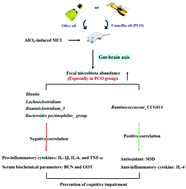Protective effects of camellia and olive oils against cognitive impairment via gut microbiota-brain communication in rats
Abstract
Food intake influences neurofunction via the gut microbiota-brain axis. Monounsaturated fatty acid (MUFA) consumption is highly associated with neuroprotection; the mechanism behind the effects of olive oil and camellia oil on gut microbiota remains unclear. In this study, the objective was to compare the neuroprotective role of oleic acid-rich camellia oil and olive oil against AlCl3-induced mild cognitive impairment (MCI) in rats. Morris water maze tests revealed that learning and memory capacities improved in AlCl3-induced rats subjected to camellia oil administration better than olive oil treatment. Moreover, the results showed that the camellia oil- and olive oil-treated AlCl3-induced rat groups had significantly reduced oxidative stress and inflammatory cytokines. Notably, Spearman correlation analysis indicated that the inflammatory cytokines negatively correlated with the microbial strains (Bacteroides pectinophilus_group and Blautia) in response to camellia oil administration. Furthermore, Ruminococcaceae_UCG014 abundance was significantly enhanced by camellia oil intake, which was highly positively associated with antioxidant activity expression. In conclusion, the novel data suggest that the outcomes of camellia oil consumption were superior to those of olive oil intake as camellia oil may have a beneficial effect on MCI protection and improvement through the gut microbiota-brain communication.



 Please wait while we load your content...
Please wait while we load your content...